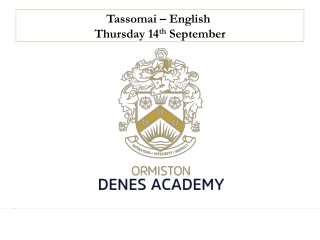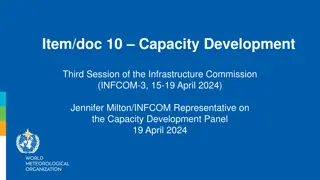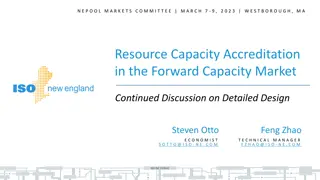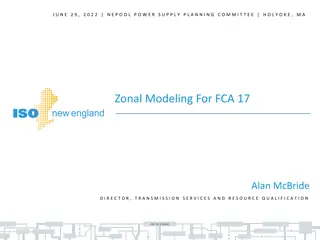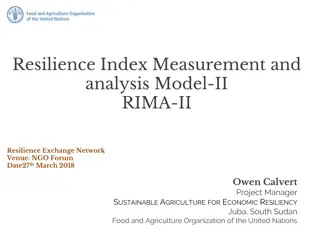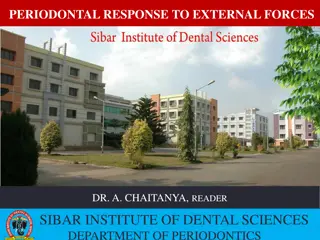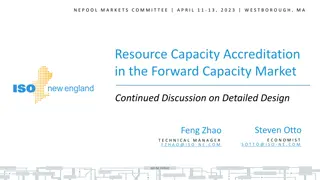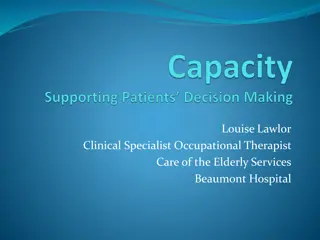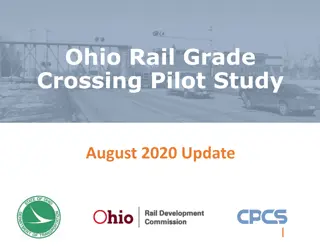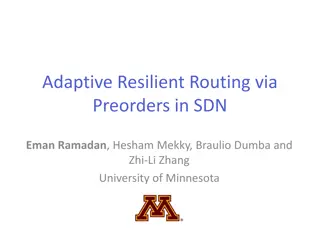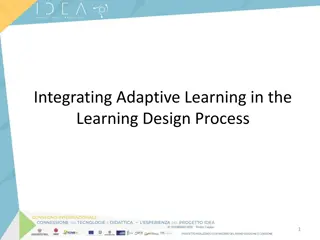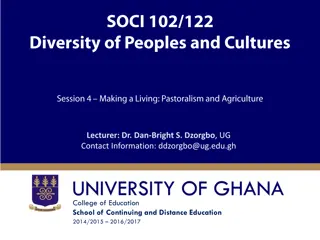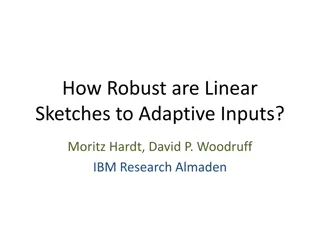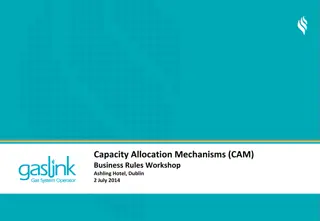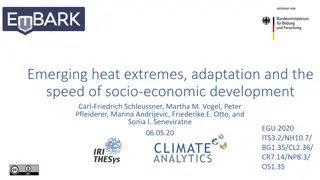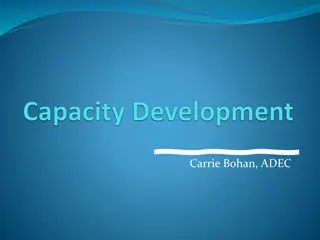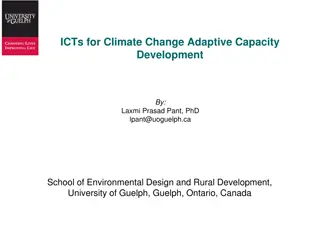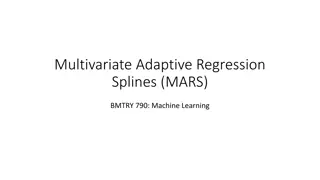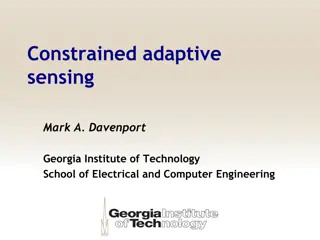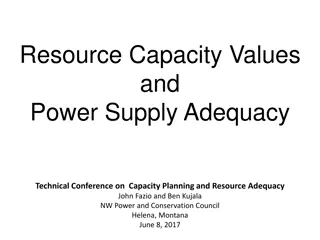Adaptive Tree-based Convergecast Protocol
Adaptive tree-based protocol for managing overlay networks in heterogeneous networks. It proposes improvements to the existing Tree-Based Convergecast Routing (TBCR) protocol by considering additional parameters such as RTT, power consumption, link stability, and link mobility to optimize routing de
32 views • 12 slides
Tassomai: Maximizing Learning Potential Through Adaptive Quizzing
Tassomai is an online tool with quizzes powered by an adaptive algorithm. It helps strengthen weaker areas and provides tailored support to enhance learning. By completing daily goals and earning points through quizzes, students can unlock more challenging topics and deepen their understanding.
0 views • 26 slides
Global Adaptive AI Market
The Global Adaptive AI Market Size is Anticipated to Exceed USD 32435.5 Million by 2033, Growing at a CAGR of 41.1% from 2023 to 2033.
0 views • 5 slides
Global Adaptive AI Market
The Global Adaptive AI Market Size is Anticipated to Exceed USD 32435.5 Million by 2033, Growing at a CAGR of 41.1% from 2023 to 2033.
0 views • 5 slides
Global Adaptive AI Market Size, Share, Forecast 2023 – 2033
The Global Adaptive AI Market Size is Anticipated to Exceed USD 32435.5 Million by 2033, Growing at a CAGR of 41.1% from 2023 to 2033.\n\n
1 views • 4 slides
Localised Adaptive Spatial-Temporal Graph Neural Network
This paper introduces the Localised Adaptive Spatial-Temporal Graph Neural Network model, focusing on the importance of spatial-temporal data modeling in graph structures. The challenges of balancing spatial and temporal dependencies for accurate inference are addressed, along with the use of distri
3 views • 19 slides
INFCOM Capacity Development Initiatives Overview
INFCOM's capacity development initiatives focus on enhancing Earth system observations, closing capacity gaps on weather services, and supporting new opportunities in competencies and capabilities. Collaboration and coordination mechanisms have been established to facilitate sharing of information a
0 views • 11 slides
Resource Capacity Accreditation in Forward Capacity Market Overview
Resource Capacity Accreditation project aims to enhance ISO-NE's accreditation processes in the Forward Capacity Market, supporting a reliable, clean-energy transition. Key concepts covered in this educational presentation include accreditation space, methods, benefits, challenges, and improvement o
1 views • 53 slides
Resource Capacity Accreditation in the Forward Capacity Market Discussion
The presentation discusses improvements in the Resource Capacity Accreditation project of ISO-NE's Forward Capacity Market to support a reliable, clean-energy transition. It includes details on seasonal components, reconfiguration auctions, trading obligations, and stakeholder schedules. Examples pr
3 views • 71 slides
Capacity Zone Modeling for Forward Capacity Auction 17 Results
This presentation unveils the Capacity Zone modeling calculations for Forward Capacity Auction 17 associated with the 2026-2027 Capacity Commitment Period by ISO-NE PUBLIC. It delves into boundary definitions, import-constrained zone modeling, and market rules guiding the assessments and modeling pr
0 views • 16 slides
Smart Antenna Systems Overview: Enhancing Wireless Performance
Smart antenna systems, like adaptive array antennas and switched beam antennas, combine antenna arrays with digital signal processing to transmit and receive signals adaptively. These systems improve signal quality, reduce interference, and increase capacity by dynamically adjusting radiation patter
0 views • 20 slides
Proposal for Resource Capacity Accreditation in Forward Capacity Market
The ISO-NE has proposed improvements to the accreditation processes in the Forward Capacity Market (FCM) through the Resource Capacity Accreditation (RCA) project. The aim is to enhance the accreditation of resource contributions to ensure reliability during the transition to a cleaner energy mix. T
0 views • 59 slides
Understanding the RIMA-II Model for Resilience Measurement in Agricultural Development
The RIMA-II model offers an innovative quantitative approach to measuring resilience in the context of food insecurity. It provides a framework for understanding how households cope with shocks and stressors, enabling effective assistance for vulnerable populations to build food secure and resilient
5 views • 18 slides
Periodontal Response to External Forces in Periodontics
Adaptive capacity of the periodontium in response to occlusal forces is variable, influenced by factors like magnitude, direction, duration, and frequency. Trauma from occlusion occurs when occlusal forces exceed tissue's adaptive capacity, leading to tissue injury. It is classified into acute and c
0 views • 40 slides
Resource Capacity Accreditation in the Forward Capacity Market: Continued Discussion and Detailed Design
The Resource Capacity Accreditation (RCA) project by ISO-NE aims to enhance accreditation processes in the Forward Capacity Market (FCM) to support a reliable, clean-energy transition. This presentation focuses on seasonal components of Capacity Supply Obligations (CSO), Pay-for-Performance (PFP) ob
0 views • 58 slides
Understanding Self-Neglect, Hoarding, and the Mental Capacity Act (2005)
Self-neglect and hoarding are complex issues often intertwined with mental capacity challenges. The Mental Capacity Act (2005) outlines capacity assessments, decision-making criteria, and challenges faced by professionals in safeguarding individuals. Recognizing the need for trauma-informed care in
1 views • 16 slides
Understanding Legal and Mental Capacity in Healthcare Decisions
Clinical specialist occupational therapist, Louise Lawlor, advocates for patients' rights and decision-making capacity in healthcare settings. She emphasizes the importance of legal and mental capacity in making informed decisions, highlighting relevant legislation, guidance documents, and a functio
0 views • 24 slides
Exploring Capacity and Volume in Practical Settings
Explore the concepts of volume and capacity through engaging activities involving measuring liquid in containers, understanding units like milliliters and liters, and solving capacity-related questions. Discover how to work out different measurements and practice practical capacity in the kitchen wi
0 views • 7 slides
Understanding Enthalpy and Heat Capacity in Chemistry
Enthalpy is a measure of total energy in a system, represented as H = E + P.V. Heat at constant pressure relates to enthalpy changes. Calorimetry and heat capacity help measure and understand heat in chemical reactions. Specific heat capacity and molar heat capacity play key roles in determining ene
0 views • 16 slides
Workshop on New Approaches to Statistical Capacity Development in Lao PDR
This workshop, hosted by PARIS21 and UNDP, focuses on enhancing statistical capacity development in Lao PDR. It covers topics like successful capacity development programs, partnerships for national statistics development, and prioritizing needs versus international requirements. The Lao Statistics
0 views • 15 slides
Changes in Capacity Allocation Regulations for Gas Infrastructures in Portugal
The new regulation in Portugal brings significant changes in capacity booking and trading to promote convergence with CAM NC and enable a secondary market. Major changes include ex-ante payment of capacity rights, capacity allocation via a booking platform, and enhancement of liquidity in the second
0 views • 13 slides
The Assisted Decision-Making (Capacity) Act 2015 in the Criminal Justice Context
The Assisted Decision-Making (Capacity) Act 2015 introduces key reforms such as the abolition of wards of court system for adults, a statutory functional test of capacity, new guiding principles, a three-tier framework for support, and tools for advance planning. It emphasizes functional assessment
0 views • 17 slides
Understanding Capacity Challenges in Wills: Legal Insights
Testators must possess mental capacity when making a will, as established in legal cases like Banks v. Goodfellow. The common law test for testamentary capacity remains relevant despite the Mental Capacity Act 2005. The Banks v. Goodfellow test outlines the required mental power for making a valid w
0 views • 18 slides
Ohio Rail Grade Crossing Pilot Study Update August 2020
Ohio Rail Grade Crossing Pilot Study Update August 2020 provides insights into the methodology developed to evaluate rail-road grade crossings in Ohio, emphasizing adaptive capacity assessment tools and scoring. The study's objectives include assessing crossing importance, redundancy, and adaptabili
0 views • 12 slides
Optical Fiber Calibration System & Adaptive Power Supply by J. Cvach
Introduction to an optical fiber calibration system and adaptive power supply developed by J. Cvach from the Institute of Physics, ASCR, Prague. The system includes an LED driver, notched fibers, and adaptive power supply for various applications, such as the calibration of the CALICE AHCAL and LHCb
0 views • 13 slides
Adaptive Resilient Routing via Preorders in SDN
This research paper discusses the challenges of path-based routing in modern networks and introduces a novel approach called Adaptive Resilient Routing via Preorders in Software-Defined Networking (SDN). The authors emphasize the limitations of traditional routing schemes, the importance of resilien
0 views • 42 slides
Enhancing Learning Design with Adaptive Learning Solutions
Explore the integration of adaptive learning in educational design processes to address common challenges such as high drop-out rates and student disengagement. Discover key players in learning design and the benefits of intelligent adaptive learning systems in catering to individual student needs e
0 views • 56 slides
Somerset Mental Capacity Training Session June 2023
This information outlines a mental capacity drop-in session for care providers in June 2023, hosted by Chris Hamilton from Somerset Council. It covers topics like the aim of the Mental Capacity Act, the Somerset mental capacity competency framework, and the importance of staff training. It emphasize
0 views • 21 slides
Understanding Horticulture and Agriculture: Adaptive Strategies in Human History
This article delves into the development of adaptive mechanisms in human history, focusing on horticulture and agriculture as key strategies. It explains the differences between horticulture and agriculture, explores the concept of cultivation continuum, and discusses pastoralism as an adaptive stra
0 views • 13 slides
Evaluating Adaptive Attacks on Adversarial Example Defenses
This content discusses the challenges in properly evaluating defenses against adversarial examples, highlighting the importance of adaptive evaluation methods. While consensus on strong evaluation standards is noted, many defenses are still found to be vulnerable. The work presents 13 case studies o
0 views • 9 slides
Robustness of Linear Sketches to Adaptive Inputs in Big Data Processing
Exploring the robustness of linear sketches in handling adaptive inputs in big data scenarios. The study covers applications like compressed sensing, data streams, and distributed computation. It delves into the challenges posed by adaptive inputs and the implications for correctness and efficiency
0 views • 27 slides
Capacity Allocation Mechanisms (CAM) Business Rules Workshop Summary
This summary provides insights into the Capacity Allocation Mechanisms (CAM) Business Rules Workshop held at Ashling Hotel, Dublin on July 2, 2014. The workshop covered topics such as CAM business rules scope, key features, auction processes, code modifications, implementation timelines, and consult
0 views • 32 slides
Assessing Climate Resilience Building and Adaptation Readiness
The study explores the emerging heat extremes and the speed of socio-economic development in the context of climate resilience building and adaptation readiness. It assesses the effectiveness of resilience building through the integration of adaptive capacity and climate scenarios, focusing on tempo
0 views • 9 slides
Explore Adaptive Recreation and Sports for Individuals with Disabilities
Discover adaptive recreation opportunities for individuals with disabilities, including winter and summer activities such as skiing, biking, kayaking, and rock climbing. Learn about the mission of providing inclusive leisure options and find volunteer opportunities with organizations like High Count
0 views • 8 slides
Understanding Capacity Development in Water Systems
Capacity development is crucial for water systems to acquire and maintain technical, managerial, and financial capabilities in order to consistently provide safe drinking water. Federal requirements mandate new public water systems to demonstrate capacity, with states required to have strategies to
0 views • 8 slides
Enhancing Climate Change Adaptive Capacity Through ICTs
Developing adaptive capacity to address climate change in vulnerable communities is crucial. Integrating expert and local knowledge using Information and Communication Technologies (ICTs) can help, but challenges like digital exclusion must be overcome. Understanding climate change as a complex prob
0 views • 12 slides
Multivariate Adaptive Regression Splines (MARS) in Machine Learning
Multivariate Adaptive Regression Splines (MARS) offer a flexible approach in machine learning by combining features of linear regression, non-linear regression, and basis expansions. Unlike traditional models, MARS makes no assumptions about the underlying functional relationship, leading to improve
0 views • 42 slides
Constrained Adaptive Sensing and Benefits of Adaptivity
Constrained adaptive sensing involves estimating sparse signals with constraints, utilizing strategies like nonadaptive sensing and adaptive sensing. Benefits of adaptivity include reducing errors and improving estimation accuracy in signal processing. It explores the potential for improvement in re
0 views • 17 slides
Understanding Human Adaptive Strategies: A Historical Perspective
Humans have utilized various adaptive strategies throughout history to survive and secure a livelihood, including hunting-gathering, horticulture, pastoralism, etc. This session introduces these strategies, their characteristics, and why they persist in modern times. The discussion also covers the h
0 views • 11 slides
Resource Capacity Values and Power Supply Adequacy Conference Highlights
Explore insights from the Resource Capacity Values and Power Supply Adequacy Technical Conference, covering topics like integrated vs. standalone capacity values, utilizing hydro storage to increase capacity, and the 2021-22 Adequacy Summary. Learn about the importance of integrated capacity values
0 views • 9 slides

